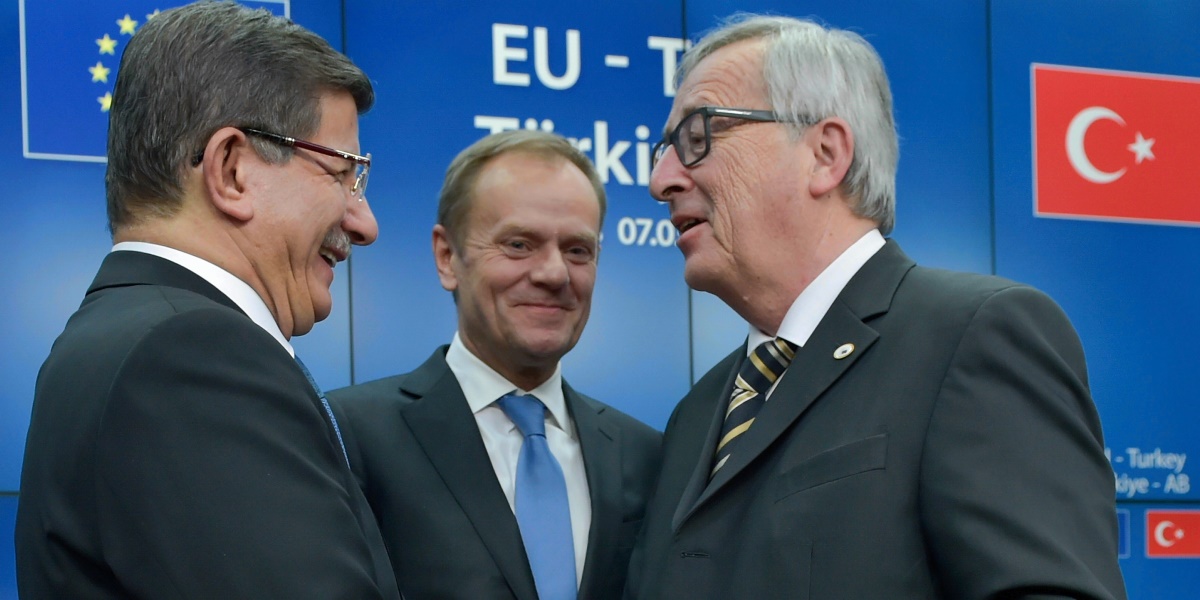
When EU Values Get in the Way of Progress
The overdue EU attempt to find a solution to the Syrian civil war and its resulting crises, aided by Ankara, is an opportunity for European values to end the ambiguity of its stance
Share
The mass movement of Syrian refugees poses the greatest challenge to the European Union since the eurozone crisis. The organization, itself born out of another major crisis, World War II, has been unable to address the problem due to the lack of a comprehensive Syria strategy and migration policy.
Before the Arab Spring revolutions, EU leaders had realized that the union's future closely depended on the emergence of democratic and stable governments across North Africa, the Balkans and the Middle East. Seeing that there was no way to address a range of problems, including security threats and refugee flows, the European Union sponsored a number of nongovernmental initiatives to promote democracy.
When the revolution turned into a humanitarian crisis in Syria, however, EU leaders looked the other way and prayed that somebody else would put out the fire. Meanwhile, the United States tried to outsource its job as the world police to regional players, which only deepened the crisis. Most recently, Russia's interference in the Syrian civil war triggered a new refugee wave to Europe.
In the wake of the refugee crisis, EU leaders were unable to settle approximately 1 million people in some of the world's wealthiest countries. After months of procrastination, the governments of Austria, Hungary and Balkan countries came up with the brilliant idea of shutting down the Balkan route in a move that might deal a deadly blow to Greece's struggling economy.
Over the past year, German Chancellor Angela Merkel has assumed a relatively rational position compared to her colleagues by taking major political risks to cooperate with Turkey on the migrant crisis. At a special summit in Brussels last week, Merkel even supported a new set of demands raised by Prime Minister Ahmet Davutoğlu to fix the problem. With elections coming up in three German states next week, Merkel finds herself under criticism from conservatives, leftists and the Greens over the migrant deal.
Guy Verhofstadt, the Belgian leader of the Alliance of Liberals and Democrats at European Parliament, even turned the debate into a question about Europe. In an article published by The Guardian on Thursday, he warned that the proposed terms "betray Europe's values" and called on EU leaders not to "drink from [President Recep Tayyip] Erdoğan's poisoned chalice." The European Union, Verhofstadt argued, should instead work with the U.N. High Commissioner for Refugees (UNHCR) to develop an alternative roadmap that would include heavier sanctions on Russia and a new effort to broker a political solution in Syria. In response to mounting criticism, Peter Altmaier, a German politician in charge of coordinating his country's response to the migrant crisis, told Frankfurter Allgemeine Zeitung that Turkey had "behaved more European than many EU member states" over the course of the Syrian civil war.
Behind the smokescreen of big statements about European values and Turkey's authoritarian turn, Europeans are coming to terms with the fact that they must work with the Turkish government to keep a lid on the chaos in the Middle East, which for the time being manifests itself in the form of a refugee and migrant crisis. Turkey's leaders, in turn, are trying to blend the EU's urgent needs with their demands to help Brussels develop a comprehensive migration policy. Let us hope that common sense will prevail over geopolitics among EU decision makers.
[Daily Sabah, March 12, 2016]
Tags »
Related Articles






